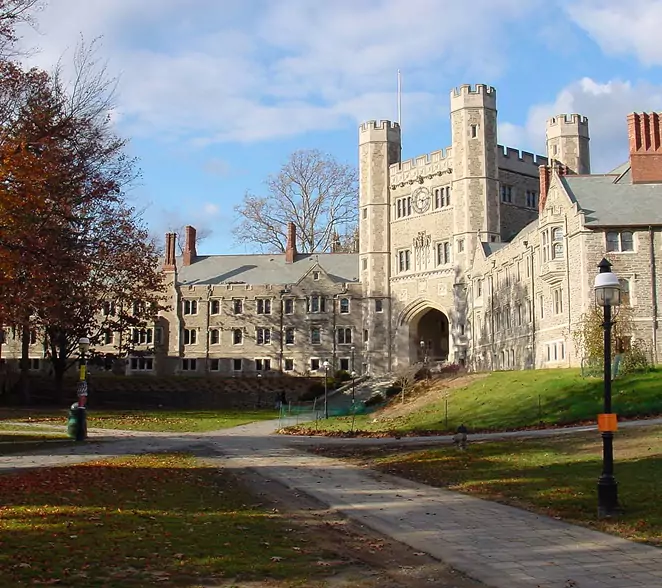Princeton University Emotional Support Animal Policy



Princeton University Main Takeaways:
-

Students must follow Princeton’s formal request process to receive accommodation for their Emotional Support Animal (ESA).
-

Proper documentation, including a valid ESA letter from a licensed mental health professional, is mandatory.
-

Only certain animals qualify as ESAs, and they must meet specific behavioral and health standards.
-

ESAs are allowed in university housing but must not disrupt the living environment of other students.
-

Students are fully responsible for caring for and managing their ESA on campus.
Princeton University supports students with disabilities by allowing emotional support animals (ESAs) in University housing as a reasonable accommodation. This policy outlines the criteria for qualifying for an ESA, the application process, and the responsibilities of students who are approved to have an ESA in their dormitory or rental unit. The policy ensures that all students have an equal opportunity to enjoy University housing while maintaining the integrity and safety of the campus environment.
Legal Framework
Princeton University’s Emotional Support Animal (ESA) policy is shaped by federal laws and regulations designed to protect individuals with disabilities, ensuring they have equal access to educational opportunities and housing accommodations. The key legal frameworks influencing this policy include:
Fair Housing Act (FHA)
The Fair Housing Act (FHA) is a federal law that prohibits discrimination in housing based on race, color, religion, sex, familial status, national origin, or disability. Under the FHA, individuals with disabilities are entitled to reasonable accommodations in housing, which may include the right to keep an ESA, even in buildings or residences that otherwise prohibit pets. The FHA requires that universities, like other housing providers, make exceptions to pet policies when an ESA is necessary for the individual with a disability to have an equal opportunity to use and enjoy their dwelling.

Americans with Disabilities Act (ADA)
While the Americans with Disabilities Act (ADA) primarily governs public spaces and services, it is crucial to understand its distinction between Service Animals and Emotional Support Animals. The ADA recognizes Service Animals, particularly dogs, that are trained to perform specific tasks for individuals with disabilities. However, ESAs, which provide comfort through companionship, are not granted the same public access rights under the ADA. As such, ESAs are not allowed in Princeton’s non-residential buildings (e.g., classrooms, dining halls) under ADA guidelines but are accommodated in housing under the FHA.

Section 504 of the Rehabilitation Act of 1973
Section 504 is a federal law that prohibits discrimination based on disability in programs and activities, including those offered by federally funded educational institutions like Princeton University. Under Section 504, the university must provide reasonable accommodations, including allowing ESAs in residential housing when necessary to ensure that students with disabilities have equal access to university programs and activities.

State and Local Laws
In addition to federal regulations, New Jersey state laws and local ordinances may also influence ESA policies at Princeton University. These laws may offer additional protections for individuals with disabilities and could include specific provisions related to housing, service animals, and ESAs. Princeton University ensures that its ESA policy is in full compliance with relevant state and local regulations, providing a supportive environment for all students.

Who Qualifies for an Emotional Support Animal
-
Assistance Animals (ESAs)
Students with disabilities may keep an ESA in their University housing if the animal is necessary to afford them an equal opportunity to use and enjoy campus housing. The relationship between the disability and the need for the ESA must be documented, and approval must be obtained from the ODS.
-
Service Animals
Students with disabilities may keep a Service Animal in their dormitory or rental unit, as well as other venues on campus, if the animal is trained to perform tasks directly related to the student’s disability. Service Animals do not require prior approval but must be registered with the Office of Disability Services (ODS).
-
Assistance Animals (ESAs)
Students with disabilities may keep an ESA in their University housing if the animal is necessary to afford them an equal opportunity to use and enjoy campus housing. The relationship between the disability and the need for the ESA must be documented, and approval must be obtained from the ODS.
-
Service Animals
Students with disabilities may keep a Service Animal in their dormitory or rental unit, as well as other venues on campus, if the animal is trained to perform tasks directly related to the student’s disability. Service Animals do not require prior approval but must be registered with the Office of Disability Services (ODS).
Application Process for an ESA
Step 1: Documentation
Individuals must submit a Request for Emotional Support Animal Documentation Form through the Office of Disability Services (ODS), including:
- Verification of the disability from a qualified healthcare provider.
- A statement explaining the functional impact of the disability and how the ESA assists in mitigating symptoms.
- Evidence that the ESA is necessary for the individual to enjoy and use university housing on an equal basis with others.
Step 2: Review and Evaluation
The Office of Disability Services (ODS) will review the submitted documentation to determine whether the request meets the requirements for an ESA accommodation. This process may include consultations with university health professionals and possibly an interview with the student.
Step 3: Approval and Notification
If the request is approved, the ODS will notify relevant university departments, including Housing, Public Safety, and building staff, to ensure a smooth transition for the student and their ESA. The student will also receive guidelines on the responsibilities and expectations of ESA ownership.

Responsibilities of ESA Owners
- The student is responsible for the care and supervision of their ESA, including cleaning up after the animal and ensuring it does not interfere with the routine activities of the dormitory or cause difficulties for others.
- ESAs must be vaccinated and have a clean bill of health from a licensed veterinarian. Students are responsible for any damage caused by their ESA and are encouraged to maintain liability insurance.
- An emergency contact must be designated to care for the ESA if the student is unavailable. This contact must reside locally and be available within twelve hours.
- If conflicts arise due to the presence of an ESA, the University will work to resolve them, considering the needs of all parties involved.
Conflicting Needs and Resolutions
Princeton University is committed to accommodating both ESA owners and other residents who may have conflicting needs, such as allergies or phobias. Individuals with medical conditions that may be affected by the presence of an ESA should contact the Office of Disability Services to discuss possible accommodations. The university will work to find a balanced solution that meets the needs of all parties involved.
Important Considerations
- ESAs are only permitted in the student’s dormitory or rental unit and are not allowed in other campus buildings.
- Students are typically approved for only one ESA, and each request is evaluated on a case-by-case basis.
Having a hard time to decide?
licensed professional to see how Wellness Wag can help you qualify for an ESA letter online.










